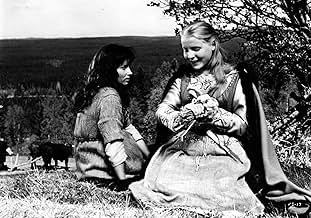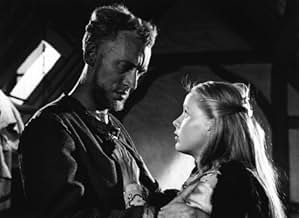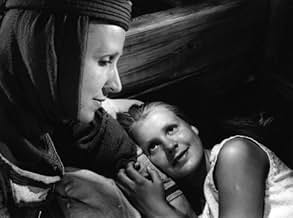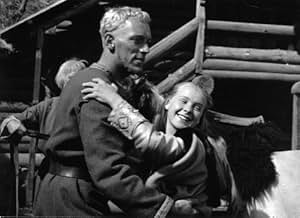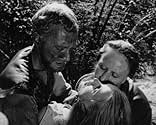Una giovane vergine innocente ma viziata e la serva incinta e gelosa della sua famiglia decidono di portare delle candele in chiesa, ma solo una torna dagli eventi che accadono nei boschi lu... Leggi tuttoUna giovane vergine innocente ma viziata e la serva incinta e gelosa della sua famiglia decidono di portare delle candele in chiesa, ma solo una torna dagli eventi che accadono nei boschi lungo la strada.Una giovane vergine innocente ma viziata e la serva incinta e gelosa della sua famiglia decidono di portare delle candele in chiesa, ma solo una torna dagli eventi che accadono nei boschi lungo la strada.
- Vincitore di 1 Oscar
- 6 vittorie e 2 candidature totali
- Den gamle drängen
- (non citato nei titoli originali)
- Den unge drängen
- (non citato nei titoli originali)
Recensioni in evidenza
**** (out of 4)
Ingmar Bergman's classic (and influential) film about three brothers, two of whom rape and kill a young girl only to end up at the girl's house later that night where her father (Max von Sydow) seeks vengeance. This was my second viewing of this film and it was certainly better this second time even though I loved it on the first viewing. As I said last year, Wes Craven's The Last House on the Left and the Italian shocker House on the Edge of the Park ripped this film off quite heavily and went over the top with graphic violence, gore, nudity and everything else imaginable yet these cheap shock thrills can't hold a candle to this film. This is masterfully directed and contains so much power that very few directors could have pulled it off. The eerie and haunting rape scene is very casual yet contains extreme power. The revenge sequence as well as the conclusion are also very subtle but pack a wonderful punch. I think it was a great choice for these scenes to play out without the use of a music score. This really helps the bitterness and creepiness of the film. A perfect atmosphere and brilliant performances really push this film over the top. von Sydow doesn't say much here but his acting with his eyes and body jesters are priceless.
The story is deceptively simple and yet filled with harrowing imagery. The assault in the woods is difficult to watch, even in these jaded times, and of course Bergman wrings the maximum tension out of it right from the very beginning. The second half is, perhaps, even more tense, with the expectation of impending violence and the strong, subtle filmmaking techniques (think: lots of lurking shadow, religious iconography, haunted faces). The excellent use of black and white photography reminded me of Kurosawa's work on RASHOMON. Max von Sydow holds it all together as the brusque father and family man, but he heads a cast who can do no wrong.
Wes Craven went for a lurid, contemporary remake in LAST HOUSE ON THE LEFT, but despite the graphic nature of Craven's film I don't think it holds a candle to this one.
Bergman's pacing and subtle direction which at one point leaves the viewer in suspense for what seems like an eternity is surely the reason for the greatness of this film. As if he were playing chess, he manipulates not only the characters, but the emotions of the viewers with intelligent and surprising maneuvers while pressing home his own sentiments regarding the story so that we may at least take into great consideration the events that we have seen. Bergman has an amazing ability to flip the atmosphere of a movie in a split second using various lighting and camera angle techniques as well as motivating his performers to follow suit. The simple expression changes on the faces of Birgitta Petterssen, Max von Sydow, Birgitta Valberg and Gunnel Lindblom at various points throughout the film quickly alter the mindset of the viewer and indicate that all is not well; so beautiful in undeniable simplicity.
'The Virgin Spring' is nothing short of a masterpiece and a film that few will be able to forget. 9½/10
This is a raw, uncompromising, unbiased parable on love and revenge; on humanity. It is set in 14th century Sweden - but its "message" is timeless: as timeless as love and vengefulness themselves. As timeless as humanity itself. Because the mores may change, but today, as 800 years ago, people are still helpless in their (perhaps inevitable) core existential ignorance, still subject to the immense pain of losing a loved one, of the inexplicable torments that often befall just and righteous, "good" people.
And that is what makes this a brutal, heartrending, unforgettable film.
Lo sapevi?
- QuizThe bridge keeper played by Axel Slangus clearly is supposed to be Odin. Beside his comments about recognizing Ingeri as if they have met before (suggesting he heard her prayer at the beginning of the film), there are several nods to Odinic lore. Before the bridge keeper appears, a raven is seated outside his hut. The raven was considered to be sacred to Odin. When the bridge keeper is finally shown up close, it can be seen that he is one-eyed, which is Odin's most prominent feature, having sacrificed an eye to attain wisdom. Finally, when Ingeri sits in the high-seat, she suddenly has seemingly clairvoyant hearing. This is a nod to Odin's high-seat Hlidskjalf, from which he could see all things happening in the world.
- BlooperWhen the Boy Goat Herder is placing dirt on Karin's body, her torso moves even though she is supposed to be dead.
- Citazioni
Beggar: See the smoke trembling under the roof as if with fright? Yet when it gets out in the air, it has the whole sky to swirl about in. But it doesn't know that, so it huddles and trembles in the soot under the roof. It's the same with people. They quiver like a leaf in the storm, afraid of what they know and what they don't know.
- ConnessioniEdited into Journal d un père (2023)
I più visti
Dettagli
Botteghino
- Lordo in tutto il mondo
- 6952 USD
- Tempo di esecuzione1 ora 29 minuti
- Colore
- Mix di suoni
- Proporzioni
- 1.37 : 1
Contribuisci a questa pagina



